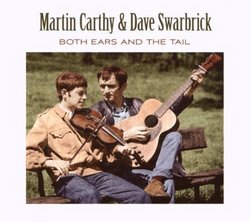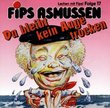| All Artists: Martin Carthy & Dave Swarbrick Title: Both Ears & The Tail Members Wishing: 2 Total Copies: 0 Label: Phantom Sound & Vision Release Date: 10/30/2007 Album Type: Import, Live Genres: Folk, International Music Styles: Traditional Folk, British & Celtic Folk, Celtic Number of Discs: 1 SwapaCD Credits: 1 UPCs: 076605251024, 0714822057226, 714822057226, 071482205722 |
Search - Martin Carthy & Dave Swarbrick :: Both Ears & The Tail
 | Martin Carthy & Dave Swarbrick Both Ears & The Tail Genres: Folk, International Music A 1966 concert recorded live at The Folkus Folk Club in Nottingham, England. Carthy and Swarbrick played as a duo for three years, recording three albums in the latter 1960s. Swarbrick went on to join Fairport Convention i... more » |
Larger Image |
CD DetailsSynopsis
Album Description A 1966 concert recorded live at The Folkus Folk Club in Nottingham, England. Carthy and Swarbrick played as a duo for three years, recording three albums in the latter 1960s. Swarbrick went on to join Fairport Convention in 1969 at the time they recorded the album 'Liege and Lief', marking his premiere recording sessions as a full time member. He was the backbone of the group for many years, leaving in 1984. Meanwhile, Carthy continued to perform and record as a solo performer and enjoyed stints in Steeleye Span, The Watersons (and later Waterson:Carthy) and Brass Monkey. However, the buzz that the duo felt in playing with each other brought them back together several more times in later years with a couple of albums in the early 1990s and then again in 2006 with their masterpiece 'Straws In The Wind'. More than 30 years after this recording was made, the duo hit the road together once more and this album provides a striking contrast and vital history of these two pillars of English folk music whose live concert performances redefine the nature of their songs. Topic 2007 Similar CDs
|
CD ReviewsTraditional Folksongs with an Edge M. Hartman | East Coast, Etats-Unis | 02/27/2002 (4 out of 5 stars) "This cd was a revelation for me. This is a rather rough live recording from the mid 1960's, that captures Carthy and Swarbrick playing passionately and off the cuff. The traditional songs presented here have all the rollick and fire of the Clancy Brothers. There are a few melancholy slow ballads here (the fantastic "The Wind that Shakes the Barley"), and there are several fabulous saucy and suggestive little ditties (the wonderfully lewd "Bonnie Black Hare") as well as some absolutely firey instrumentals. There is a certain enrgy to this recording that only a live show can generate. It's powerful, informal and a rollicking good time. Highly recommended." What shall we play? Paul Magnussen | Campbell, CA USA | 04/28/2009 (5 out of 5 stars) "Answer: Anything you like -- just play!
This little gem of an album captures, as the contemporary studio albums do not, the magic of a live Carthy & Swarbrick performance in the 60's. It seems hard to remember now that no one in the Folk Revival (except The Dubliners) was yet playing jigs and reels, and traditional musicians' performances were often ruined by clomping piano-drivers (Michael Coleman being the archetypal example). Swarbrick was like a breath of fresh air. It looks like this was recorded sometime between Martin's first and second albums, and just before Dave's pioneering Rags, Reels and Airs. Unsurprisingly, there's a large overlap in material, but some of the performances are quite different: for instance, "The Swallow Tail" and the "Marquis of Tullybardine" are on fiddle instead of mandolin, and the former is in A minor instead of E minor. The ad hoc nature of their sets is evinced by several conversations, some actually DURING the performance, e.g. the following from the first track (Dave speaking first): "What's next?" "I dunno... Drowsy Maggie." "Eh?" "Drowsy Maggie!" [...] "What's next?" "(Undecipherable)" "No." "You think of something then!" The highlight of the album for me is the last tune of this set, a stunning version of "Da Corbie an' da Craw" that is quite different from Tom Anderson's, and which they never recorded elsewhere. You also get to hear "Dill Pickles Rag" in stereo for the first time ("Rags, Reels and Airs" was only issued in mono, even on CD). The total time is 48'49"." |



